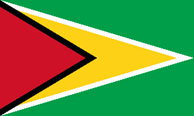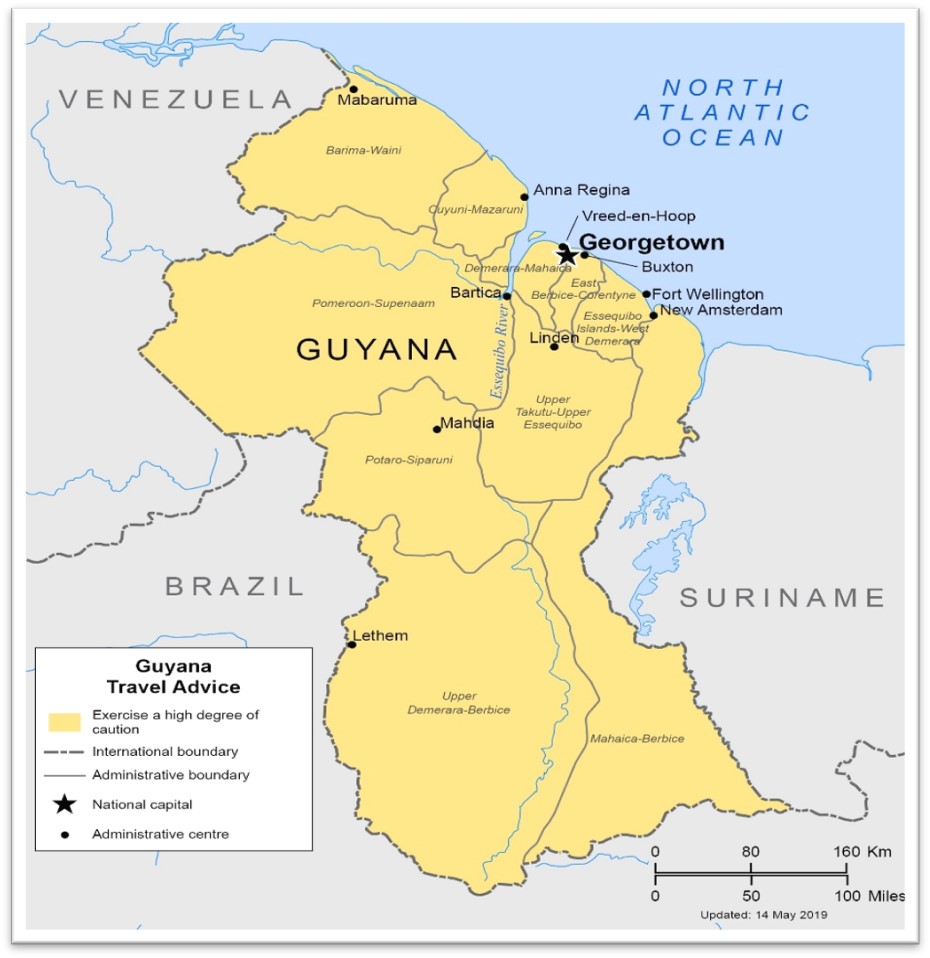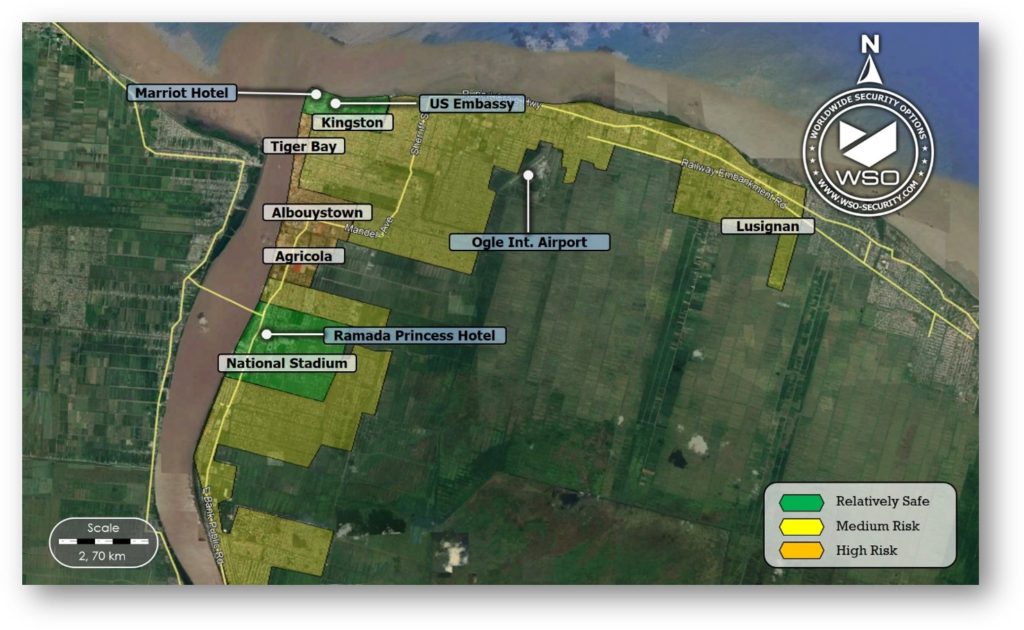| Official Name: | Co-operative Republic of Guyana |
| Official Language: | English |
| Area: | 214,970 km2 (83,000 sq mi) |
| Population: | 787,400 |
| Time Zone: | UTC−4 |
| Capital City: | Georgetown |
| Elevation (Georgetown): | 0 m (0 ft) |
| Currency: | Guyanese dollar (GYD) |
| Main Cities: | Georgetown, Linden, New Amsterdam |
| Main Port: | Port of Georgetown |
| Required visa for entry: | Nationals from Canada, Western EU countries, and the UK and others DO NOT require visas. Click here for more information concerning visa requirements. |
| Required vaccination for entry: | Yellow fever. Only for travelers coming from endemic countries. (Review epidemiological alerts by clicking here). |

Main Risks:
Theft, robbery, kidnapping, extortion, rape, drug and human trafficking, fraud, vehicle assault.
Executive Summary
Guyana features medium risks. Security risks increase considerably in remote areas beyond the main cities. Due to the surmounting threat posed by crime, we recommend procuring secure transportation services for all travel to Guyana, especially for business trips and/or itineraries involving traveling through the countryside. For high-profile trips, we further recommend hiring executive protection services.

General Risk Level: MEDIUM.
The risk generally remains stable throughout the country. That said, as a rule of thumb, it is best to avoid remote and jungle areas, especially in the border area with Venezuela. We recommend studying a security plan before traveling to Guyana, preferably under the supervision of reputable professionals.

Crime and Security
The main threat to those visiting Guyana stems from opportunistic low and medium level crime. Violent incidents are known to take place even in centric areas in Georgetown and other cities. The country is noted for having a high homicide rate and residential burglaries and shops are commonplace. Foreigners are often deliberately targeted due to perceptions of wealth. Occasionally, criminals operate in groups to follow their victims until they find a suitable moment to engaging them.
For security reasons, travel to Guyana should not proceed without procuring secure transportation services beforehand for the duration of the trip. Coupled with the risk posed by crime, the widespread lack of proper infrastructure outside Georgetown makes it difficult to travel through the countryside. We thus advise using secure transportation services if travel outside the capital is required. In any event, avoid non-essential travel to remote or sparsely populated jungle areas.
Security services in Guyana are not deemed trustworthy. The populace perceives police to be corrupt. In any event, police are not prepared to counter the threat posed by crime. For this reason, areas housing expats and the upper classes are generally guarded by private security guards.
Due to the widespread lack of information technology in the country, credit and debit cards are not usually accepted outside the main hotels. Furthermore, due to the risk of identity theft, payment by card may entrail fraud risks. Casual transactions are generally carried informally in cash. For this reason, it is best to sell USD or Euros for SRD at reputable exchange houses.
Venezuelan armed criminal groups operate in the bordering area with Venezuela. These groups are involved in drug-trafficking and illegal mining activities. In this vein, travelers should avoid non-essential travel to such areas. Moreover, given the recent discovery of oil in the country, territorial disputes with neighboring Venezuela and Suriname have gained importance. While this development does not necessarily represent a security threat to visitors, it is convenient to review the latest news to corroborate political stability in the country.
On another note, please bear in mind that Guyana is vulnerable to protracted rains, which can cause flooding and cause heavy disruptions, especially between May and July, and between December and January. Finally, for those concerned, please bear in mind that Guyana is not LGBTI friendly. Same-sex sexual relations between men are illegal and can lead to imprisonment.
Security in Georgetown
No area in the city is completely safe from crime, including the central areas frequented by foreigners. Crimes are sometimes even reported inside the main hotels. It is thus paramount to exercise vigilance and stay alert at all times, paying extra attention to private belongings. At any rate, the relatively safe areas to stay and carry out transactions are limited to Kingston, in the vicinity of the US Embassy, and the National Stadium surroundings. Please note that the Tiger Bay area and the Stabroek market are highly exposed to crime. While from a security standpoint it is still feasible to visit the city center through the Ave. of the Republic and Main St., it is necessary to exercise caution, avoiding drawing unnecessary attention. Furthermore, minimize travel on foot and refrain from traveling at night.
The Ogle International Airport (OGL) is the main entry point to the country. It is located east of Georgetown, about 15 minutes away from Kingston depending on traffic.

Transportation
For security reasons, in Guyana, public transportation should be avoided. For all itineraries resort to reputable secure transportation services. Only use taxis as a last resource, provided they are vetted by the prominent hotels, and preferably booked in advance. That said, please be advised that some taxi drivers might attempt to take advantage of foreign passengers to inflate the price of the trip. For high-profile visits, it is further recommended to hire executive protection services.
Land routes are not necessarily in good condition and are rarely illuminated. This situation can lead to security risks while traveling through the countryside, especially under poor visibility or during the dark hours. Therefore, if traveling by land, do not deviate from primary thoroughfares. It is best to avoid secondary routes removed from central localities and which remain in poorer circumstances. Be advised that in Guyana vehicles drive on the left.
If travel to Guyana involves visiting locations outside the capital city, whether for business or tourism, make sure to plan the route in advance under the supervision of local security professionals. Educated assessments should enable the security contractor to determine the safest route and avoid unilluminated or otherwise dangerous paths.
Health and Sanitary Conditions
Due to the lack of infrastructure, Guyana is vulnerable to tropical storms and heavy rains, especially outside Georgetown. Travelers should pay attention to forecasts and avoid trips during adverse weather conditions.
Travelers coming from endemic countries are required to vaccinate against yellow fever before entering the country (review epidemiological alerts clicking here). In any case, it is recommended vaccinating against tetanus, hepatitis A and B, and typhoid. Taking into account the tropical weather, it is very important to wear protection against bugs and avoid leaving body areas uncovered to mitigate the risk of suffering insect and mosquito-borne diseases such as Dengue, Chagas, and the Zika virus. These precautions should be followed at all times while entering remote and jungle areas. The quality of tap water in Georgetown is good. However, this might not be the case outside the capital, especially in remote and rural areas that lack adequate sanitary infrastructure. It is therefore recommended to drink sealed bottled water while visiting or staying in such areas.
It is not advised to travel without international health insurance covering emergency medical evacuation to the country of origin.
Take essential health precautions to mitigate the risk of contracting diseases or viruses. Carry masks in crowded places such as airports and maintain rules of social distance and avoid contact with surfaces of common use in public places. Always carry hand sanitizer.
Tactical Recommendations
Exercise vigilance and situational awareness throughout the trip to Guyana.
We recommend procuring private transportation services for all trips to Guyana. For high-profile trips, we
further recommend hiring executive protection services. For security reasons, do not use public transportation. If required, use taxis vetted by the main hotels as a last resource, preferably booked in advanced.
Avoid non-essential travel to other locations besides Georgetown, where crime and poor infrastructure pose considerable risks to security. Avoid venturing outside the capital without secure transportation services.
If travel by route through the countryside is required, avoid all detours, especially while traveling through sparsely populated rural or jungle zones. If possible, plan routes and stopovers ahead with the support of a local security contractor.
Avoid carrying large sums of cash or valuables during the trip. We advise against wearing or carrying items in public that may give the impression of economic affluence and which could attract unwanted attention from criminals.
Avoid traveling in sport or luxurious cars which could attract unwanted attention from criminals.
Do not resist armed robbery attempts. We recommend to always carry a few 1000 GYD bills for duress cases, specifically to appease criminals looking for easy money.
For security reasons, minimize travel during night hours in Georgetown and other locations.
We recommend lodging in reputable establishments and hotels with private security. In Georgetown, it is best to stay in Kingston or the vicinity of the National Stadium.
Exchange USD or euros in official exchange houses. Given the risk of identity theft, refrain from using credit and debit cards outside reputable hotels.
Avoid the vicinity of every kind of political demonstration or rally in urban areas. Peaceful protests can be infiltrated by violent elements.
Take all necessary precautions to mitigate the risk posed by insect and mosquito-borne diseases. When visiting remote locations drink sealed bottles if the quality of tap water is questionable.
As a precaution, pay attention to weather conditions and the political situation in the country before traveling.
Emergency Contacts
Police: 911
Ambulance: 913
Fire: 912
WSO Global Command Center: +1 956 467 4858 / gcc@wso-security.com
Security advice and assistance over WhatsApp: +593 99 461 1128 / +521 81 1511 3166







